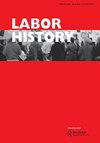CCOO工会团结问题:二律背反与悖论
IF 0.7
4区 管理学
Q1 HISTORY
引用次数: 0
摘要
摘要工会团结是佛朗哥政权后期劳工运动中争论的核心理念。本文的最初目的是考察20世纪60年代出现的新工人运动的主角奥布雷拉斯委员会的立场和行动,然后解释其从随后十年开始的演变。目的是找出这一时期创建统一工会组织项目的矛盾和悖论。随着1975年至1982年从独裁向民主的过渡,西班牙最终巩固了工会组织的多元化模式。本文章由计算机程序翻译,如有差异,请以英文原文为准。
The question of trade union unity in CCOO: antinomies and paradoxes
ABSTRACT Trade union unity was a central idea around which the debate in the labor movement coalesced during the later stages of the Franco regime. The initial aim of this paper is to examine the positions and actions of the protagonists of the new workers’ movement, Comisiones Obreras, that emerged in the 1960s, and then to interpret its evolution from the following decade onwards. The aim is to identify the antinomies and paradoxes of the projects for the creation of a unitary trade union organization during the period. With the transition from dictatorship to democracy between 1975 and 1982, a plural model of trade union organization finally became consolidated in Spain.
求助全文
通过发布文献求助,成功后即可免费获取论文全文。
去求助
来源期刊

Labor History
Multiple-
CiteScore
1.00
自引率
28.60%
发文量
44
期刊介绍:
Labor History is the pre-eminent journal for historical scholarship on labor. It is thoroughly ecumenical in its approach and showcases the work of labor historians, industrial relations scholars, labor economists, political scientists, sociologists, social movement theorists, business scholars and all others who write about labor issues. Labor History is also committed to geographical and chronological breadth. It publishes work on labor in the US and all other areas of the world. It is concerned with questions of labor in every time period, from the eighteenth century to contemporary events. Labor History provides a forum for all labor scholars, thus helping to bind together a large but fragmented area of study. By embracing all disciplines, time frames and locales, Labor History is the flagship journal of the entire field. All research articles published in the journal have undergone rigorous peer review, based on initial editor screening and refereeing by at least two anonymous referees.
 求助内容:
求助内容: 应助结果提醒方式:
应助结果提醒方式:


